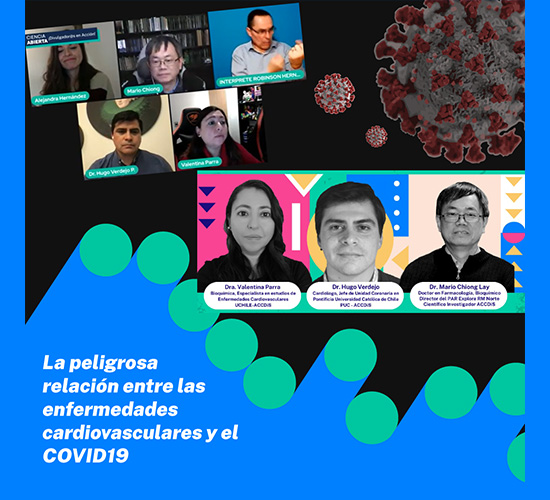The dangerous relationship between cardiovascular disease and COVID-19

Cardiovascular diseases, is a term used to refer to problems with the heart and blood vessels, this occurs when fat and cholesterol build up in the walls of the blood vessel (artery). Since the appearance of SARC-COV-2 multiple investigations account for a dangerous interaction between the virus and this type of disease, which represent the leading cause of death worldwide.
During the third conversation of Explora Northern Metropolitan Region, a panel of three scientists made up of the DRA. Valentina Parra, biochemistry and academic of the Faculty of Chemical and Pharmaceutical Sciences of the University of Chile; Dr. Hugo Verdejo, surgeon of the University of Concepción and cardiologist and the Dr. Mario Chiong, biochemist and academic of the Faculty of Chemical and Pharmaceutical Sciences of the University of Chile and director of Explora RM Norte, all researchers from the Advanced Center for Chronic Diseases (ACCDIS), answered some of the most common questions about the relationship between cardiovascular disease and COVID-19, as for example: Are people who suffer from cardiovascular disease more likely to catch the virus and have a worse diagnosis?? What consequences does COVID-19 generate in cardiovascular patients?? Is it true that SARS-COV-2 causes some damage to the heart of healthy people?? Among others.
To start The Dr. Mario Chiong, addressed the first concern explaining that according to the reports that the Ministry of Health has periodically issued, regarding the incidence of COVID-19 in Chile, approximately 36% of patients who have been hospitalized in serious condition for the virus suffer from high blood pressure, 1 in 5 have diabetes and almost 7% of hospitalized patients suffer from obesity, "i.e., among these three diseases there is talk of 70% of people suffering from comorbidity, which represent risk factors for severe COVID-19 illness", Explained.
On the other hand, the Dra. Valentina Parra recalled that unfortunately cardiovascular diseases are not new in Chile, the latest National Health Survey showed that 74% of the population is obese or overweight, y que el 30% de la población tiene hipertensión arterial y aproximadamente un 10% sufre de diabetes.
Could treatment for high blood pressure aggravate the PICTURE of COVID-19?
At the beginning of the pandemic, many patients stopped their treatments to treat high blood pressure because it was rumored that these drugs allowed the entry of the virus more easily or could aggravate the picture when infected with COVID19, but this is not true, dr.. Mario "In fact,, those patients who did not interrupt their medical treatment when they caught the virus, had milder symptoms, and those who stopped their treatment or habitual medication use, had more severe cases of COVID-19, por lo tanto la recomendación es que los pacientes que sufren de enfermedades crónicas como: high blood pressure, diabetes o insuficiencia cardíaca no abandonen sus tratamientos”.
Consequences of COVID-19 in patients without cardiovascular disease
Dr. Verdejo, explained that, in healthy young people - without cardiovascular disease- thrombotic complications were evidenced with some frequency, con una prevalencia de 20% o 40% de enfermedades pulmonares. "But these complications occur because of the same virus", However, stressed that while it is true that COVID-19 hurts the heart, it is very mild and does not produce direct inflammation to this indispensable organ.
COVID-19 and patients with cardiovascular disease
Regarding this concern, Dr. Verdejo recalcó que estos pacientes presentan 7 veces más riesgo de complicaciones que la población en general. In addition, reported that, en este escenario se evidenció un aumento de infartos de la menos 5%.
Among the clinical manifestations as the most common evidenced in Chile in the world, en las personas que se enferman por COVID-19 se describen “aproximadamente un 20% de los pacientes presenta atrial fibrillation, this is an abnormal heart rhythm change or disturbance. Another very frequent event, is the appearing of thrombi (formation of a blood clot inside a blood vessel or in the heart) at the beginning of the disease not much was known about this manifestation, but as the virus has been studied this has become one of the most striking features in severe patients and product of thrombi., obstruction of blood vessels is generated, which causes heart attacks or cerebral infarctions," explained dr.. Chiong.
To finish, Le Dr. Verdejo said "The impact of COVID on heart disease has been quite complex and not only because of the direct effects of the virus., but also by the number of people with basic pathologies that, for logistical issues of the health system, have delayed the regular monitoring of many patients".
See full discussion at https://www.youtube.com/watch?v=fslczrv81vM&t=696s&ab_channel=ExploraRMNorte
 El próximo 30 de septiembre desde las 18:00 hours, Explora RM Norte will hold its fourth Open Science conversation "History", Latin American culture and traditions" and will talk with Cristóbal Gracia, historian and academic of the Faculty of Law of the University of Santiago; Alejandra Alvear, Social anthropologist at the University of Chile and with Juan Pablo González, musicologist, Doctor of Musicology from the University of California and Academic at the Institute of History of the Catholic University.
El próximo 30 de septiembre desde las 18:00 hours, Explora RM Norte will hold its fourth Open Science conversation "History", Latin American culture and traditions" and will talk with Cristóbal Gracia, historian and academic of the Faculty of Law of the University of Santiago; Alejandra Alvear, Social anthropologist at the University of Chile and with Juan Pablo González, musicologist, Doctor of Musicology from the University of California and Academic at the Institute of History of the Catholic University.
The broadcast is done live on its channel of Youtube.
Explore NORTH RM, is an associative project led by the University of Chile through the Faculty of Chemical and Pharmaceutical Sciences and its executing unit is the Advanced Center for Chronic Diseases (ACCDiS ).
